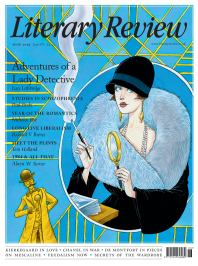Sam Kitchener
Gangster’s Paradise
Night Boat to Tangier
By Kevin Barry
Canongate 224pp £14.99
A work by an Irish writer in which two men wait for someone important who never turns up, passing the time in discussion of meals, aches and death, is hardly unfamiliar territory. The resemblance between Charlie Redmond and Maurice (‘Moss’) Hearne, the ‘mildly natty, mildly decrepit’ double act at the centre of Kevin Barry’s third novel (which began life as a play written for Dublin’s Abbey Theatre), and the tramps in Waiting for Godot even extends to the bowler hat perched on Moss’s head. Moss’s and Charlie’s back stories are given in more detail than those of their Beckettian counterparts, and are seedier. This ‘vaudeville pair’ are ageing gangsters from County Cork, though for all we know Estragon may also have slashed his own eye with a razor while suffering a drug-fuelled breakdown in the Spanish port of Algeciras, and who’s to say Vladimir didn’t have his knee ligaments sliced at a dockside dive bar?
We first meet Moss and Charlie sitting in the Algeciras ferry terminal in October 2018, getting drunk on Hennessy and cava, waiting for Moss’s missing daughter, Dilly, who they’ve been told is either leaving for Tangier or returning from there in a convoy of fellow hippies, or ‘crusties’. Through a series of flashbacks we learn that the Hearne and Redmond fortunes were made through a dope heist in Málaga back in 1994, to the chagrin of the local Costa del Sol cartels, who chased Moss, his wife, Cynthia, and an infant Dilly across Europe. We see Moss and Cynthia buy several properties through which to launder their ill-gotten gains, take lots of drugs, have lots of sex, fight and separate. Moss falls out with Charlie and returns to Spain, where he descends into violent depression.
The story is a rollicking one, more In Bruges than Samuel Beckett, and it is briskly told, in short paragraphs, with a dark wit and deftly managed suspense. Barry’s reputation is as a prose stylist with a taste for bravura conceits: his first novel, City of Bohane (2011), was a western set on the Irish coast in 2053; Beatlebone (2015) reimagined a real-life trip made by John Lennon to Ireland in 1967. Here, Barry’s lyrical phrase-making – through the window of a sanatorium, Moss sees the ‘first swallows of the year darting across the patch of sky outside, drawing out their fast invisible threads’ – gives the book an elegiac air that is deliberately at odds with the violence of the events described.
Other images and phrases are repeated: the bar Moss buys in the Gràcia district of Barcelona is ‘known for its anchovies’; the crowds in Málaga are described as a ‘swarm of fast anchovy faces’. Charlie and Moss could be any fading roisterers reflecting on past mistakes, savouring the details of even painful recollections, their addled memories reduced to a succession of recurring images. Good fun is had with their ragings against changing times: ‘Gràcia was not what it had been even five years previously. There was no longer good heroin. Now there were stores that sold specialist honey.’
The domestic travails and the soulfulness of gangsters, though, are familiar terrain, from the Kray brothers’ devotion to their mum to The Sopranos. The passages in which the two old thugs sit waxing sentimental, high on their own eloquence, are the least engaging in the book. Barry may give Dilly some tart observations on the rough underside of her father’s loquacious charm (‘watch for the glamorous sentence that appears from nowhere – it might have plans for you’), but the tenderness he shows for his criminal subjects, however finely done, in the end feels misplaced.

Sign Up to our newsletter
Receive free articles, highlights from the archive, news, details of prizes, and much more.@Lit_Review
Follow Literary Review on Twitter
Twitter Feed
Under its longest-serving editor, Graydon Carter, Vanity Fair was that rare thing – a New York society magazine that published serious journalism.
@PeterPeteryork looks at what Carter got right.
Peter York - Deluxe Editions
Peter York: Deluxe Editions - When the Going Was Good: An Editor’s Adventures During the Last Golden Age of Magazines by Graydon Carter
literaryreview.co.uk
Henry James returned to America in 1904 with three objectives: to see his brother William, to deliver a series of lectures on Balzac, and to gather material for a pair of books about modern America.
Peter Rose follows James out west.
Peter Rose - The Restless Analyst
Peter Rose: The Restless Analyst - Henry James Comes Home: Rediscovering America in the Gilded Age by Peter Brooks...
literaryreview.co.uk
Vladimir Putin served his apprenticeship in the KGB toward the end of the Cold War, a period during which Western societies were infiltrated by so-called 'illegals'.
Piers Brendon examines how the culture of Soviet spycraft shaped his thinking.
Piers Brendon - Tinker, Tailor, Sleeper, Troll
Piers Brendon: Tinker, Tailor, Sleeper, Troll - The Illegals: Russia’s Most Audacious Spies and the Plot to Infiltrate the West by Shaun Walker
literaryreview.co.uk